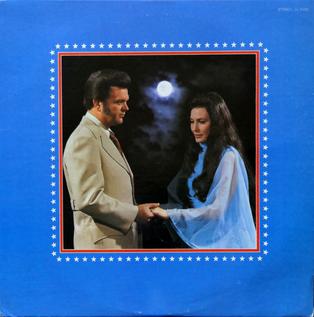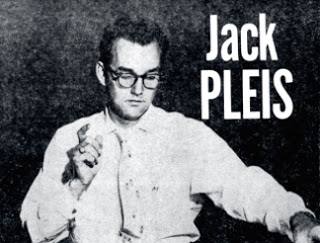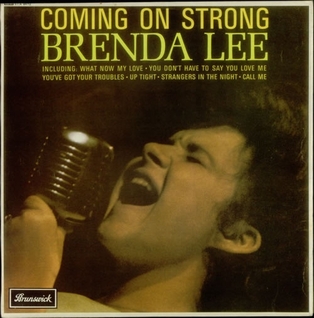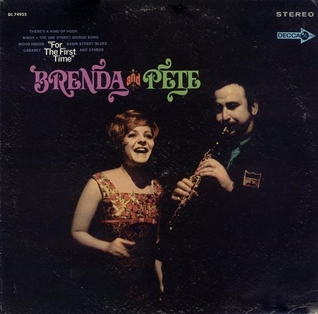
In music, a single is a type of release, typically a song recording of fewer tracks than an LP record or an album. One can be released for sale to the public in a variety of formats. In most cases, a single is a song that is released separately from an album, although it usually also appears on an album. In other cases a recording released as a single may not appear on an album.

An extended play (EP) is a musical recording that contains more tracks than a single but fewer than an album or LP record. Contemporary EPs generally contain up to eight tracks and have a playing time of 15 to 30 minutes. An "EP" is usually less cohesive than an album and more "non-committal".
"The Poor People of Paris" is a US pop song that became a number-one instrumental hit in 1956. It is based on the French language song "La goualante du pauvre Jean", with music by Marguerite Monnot and words by René Rouzaud. Edith Piaf had one of her biggest hits with the original French version.

Tanya Tucker is the self-titled fourth studio album by American country music singer Tanya Tucker. It was released on April 21, 1975, by MCA Records. The album was produced by Snuff Garrett and includes two No. 1 singles, "Lizzie and the Rainman" and "San Antonio Stroll".

Heartbreaker is the twentieth solo studio album by American singer-songwriter Dolly Parton. It was released on July 17, 1978, by RCA Victor. The album was produced by Gary Klein and Parton with Charles Koppelman serving as executive producer, and was an even more direct aim at the pop charts, with several of its songs verging on disco. The album topped the Billboard Top Country Albums chart for nine consecutive weeks and peaked at number 27 on the Billboard 200. The album produced two number one hits on the Billboard Hot Country Songs chart, "Heartbreaker" and "I Really Got the Feeling", while "Baby I'm Burnin'" peaked at number 25 on the Billboard Hot 100. The album has been certified Gold in the United States and Canada.

Bobbie Gentry and Glen Campbell is a studio album by American singer-songwriters Bobbie Gentry and Glen Campbell. It was released on September 16, 1968, by Capitol Records.

Merry Christmas is a Christmas-themed compilation album by Bing Crosby that was released in 1945 on Decca Records. It has remained in print through the vinyl, CD, and downloadable file eras, currently as the disc and digital album White Christmas on MCA Records, a part of the Universal Music Group, and currently on vinyl as Merry Christmas on Geffen Records. It includes Crosby's signature song "White Christmas", the best-selling single of all time with estimated sales of over 50 million copies worldwide. The album was certified 4× Platinum by RIAA for selling over 4 million copies in United States. The original 1945 release and subsequent re-releases and re-packages spent a total of 39 weeks at no. 1 on the Billboard pop albums chart.

Leonard George DeStoppelaire, better known as Lenny Dee, was an American virtuoso organist who played many styles of music. His record albums were among the most popular of easy listening and space age pop organists of the 1950s through the early 1970s. His signature hit, "Plantation Boogie", charted as a Top 20 hit in 1955. He also had a gold record with 1970's Spinning Wheel.

By Request is a studio album by American singer Brenda Lee. It was released on May 18, 1964 via Decca Records and contained 12 tracks. A majority of the album featured covers of songs first made popular by other recording artists of the era. Of its new recordings were three singles: "I Wonder", "The Grass Is Greener" and "As Usual". The singles reached top ten and top 20 positions on record charts throughout the world. By Request was met with mixed reviews upon its release.

We Only Make Believe is the first collaborative studio album by Conway Twitty and Loretta Lynn. It was released on February 1, 1971, by Decca Records.

I Wanna Be Free is the seventeenth solo studio album by American country music singer-songwriter Loretta Lynn. It was released on May 3, 1971, by Decca Records.

One's on the Way is the nineteenth solo studio album by American country music singer-songwriter Loretta Lynn. It was released on March 6, 1972, by Decca Records.

Lead Me On is the second collaborative studio album by Conway Twitty and Loretta Lynn. It was released on January 17, 1972, by Decca Records.

Jack K. Pleis was an American jazz pianist, arranger, conductor, composer and producer. He recorded on London and Decca Records in the 1950s, and Columbia Records in the 1960s. During the course of his career, Pleis worked with many artists, including Louis Armstrong, Harry Belafonte, Bing Crosby, Sammy Davis Jr., Benny Goodman, Earl Grant, Brenda Lee, and Joe Williams. Between 1950 and 1976, more than 150 songs were arranged by Pleis. His surname is pronounced "Pleece".

St. Patrick's Day is a compilation album of phonograph records by Bing Crosby released in 1947 featuring songs with an Irish theme. This includes one of Crosby's most-beloved songs, "Too-Ra-Loo-Ra-Loo-Ral" which was number four on the Billboard Hot 100 for 12 weeks, and topped the Australian charts for an entire month, on shellac disc record. This version, the 1945 re-recording, was released earlier in another Crosby album, Selections from Going My Way.

Bad Seed is a studio album by American country music artist Jan Howard. It was released in November 1966 via Decca Records and featured 12 tracks. The third studio album of her recording career, Bad Seed was named for its title track, which reached the top ten of the country charts in 1966. The disc was met with a favorable review from Cashbox following its release.

Coming on Strong is a studio album by American singer Brenda Lee. It was released on November 28, 1966, via Decca Records and was her seventeenth studio project. The album consisted of ten tracks, many of which were covers of songs recorded by other artists. The album's title track was the only single included. It reached the top 20 on the US record chart and the top ten of the Canadian record chart. The album itself also made the US chart following its release. Coming Strong received mixed reviews from critics following its release.

For the First Time is a studio album by American singer Brenda Lee and American instrumentalist Pete Fountain. Credited under the names "Brenda and Pete", For the First Time was released by Decca Records on March 15, 1968, and featured 11 tracks. The recordings featured Lee performing lead vocals while Fountain provided instrumentation solos on his clarinet. The album was met with positive reviews from critics following its release. It also made the US albums chart in 1968.

Johnny One Time is a studio album by American singer Brenda Lee. It was released on May 19, 1969, by Decca Records and was her twentieth studio album. A total of 11 tracks comprised the album, many of which were covers. The title track was a charting single in the US and Canada in 1969. The album was met with positive reviews from critics after its release.


















